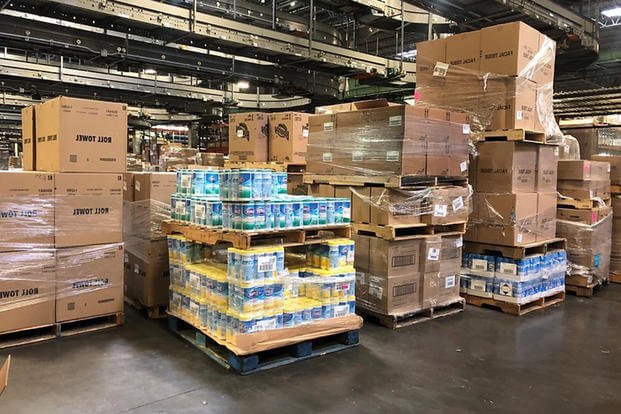The Defense Department is following restrictions on buying products for government use that contain a family of hazardous chemicals, but items containing the substances -- collectively known as PFAS -- may still be available at military exchanges, according to a government watchdog.
A review by the Government Accountability Office found that the department had "taken some steps" to implement the ban required by law on buying products containing per- and polyfluoroalkyl substances. But the DoD has not followed through on keeping products containing PFAS off military exchange shelves, according to the published update Wednesday.
That shortcoming could potentially expose consumers.
Read Next: Marine Veteran Killed Helping Evacuees in Besieged Ukrainian City
The DoD developed new guidance on the law to contracting officers and users of government purchase cards. But according to the GAO, the DoD should take steps to implement the ban at the exchanges.
"DoD has not updated its sustainable procurement guidance to reflect statutory prohibitions," GAO officials wrote in the report titled Persistent Chemicals: Actions Needed to Improve DoD's Ability to Prevent the Procurement of Items Containing PFAS. "As a result, DoD is at risk of continuing to procure items that contain certain statutorily prohibited PFAS."
A manmade group of substances, PFAS chemicals are used in industrial products such as lubricants and hydraulic fluids, non-stick cookware, food wrappers, cosmetics and stain repellents.
They also are a key ingredient in the firefighting foam used to combat ship and aircraft fires and often are dubbed "forever chemicals," because they do not break down into harmless components and can't be destroyed.
The compounds have been linked to infertility, ulcerative colitis and thyroid disease, and may contribute to testicular and kidney cancer.
The GAO found that the DoD has implemented policies on buying products containing PFAS in the government procurement process and purchase cards and agrees that the law applies to military exchanges. But the Pentagon has not figured out how to enforce the law in the exchanges.
DoD officials told the federal investigators it is unlikely that military exchanges would sell upholstered furniture and area rugs that contain PFAS, since many of the manufacturers in the U.S. have moved away from using the chemicals.
However, the exchanges do buy and resell imported goods, which could contain PFAS.
And the exchanges carry non-stick cookware or utensils, which the Environmental Protection Agency does not require to be labeled as containing PFAS.
The GAO made two recommendations to the DoD: Develop a plan to implement the law at military exchanges; and ensure that all its policies comply with the law and executive orders on limiting purchases of products containing PFAS.
DoD officials concurred with the recommendations and said they would communicate with exchange officials within 30 days about the requirements. And they added that they would "prioritize substitutes for PFAS."
On a separate note, GAO officials examined the DoD's progress on ensuring that packaging for Meals, Ready to Eat, did not contain PFAS -- a requirement that went into effect Oct. 1.
Defense Logistics Agency officials asked the vendors to confirm subcontractors that assemble MREs were not using food wrapping that contained PFAS and did not detect any "volatile" PFAS in the samples, meaning there were no detectable levels of chemicals in the air in and around the packaging.
But they did find non-volatile PFAS in all three of the samples.
The officials surmised that the detected chemicals probably came from contamination during the manufacturing process. They said their next step will be to sort out how the contamination occurs.
– Patricia Kime can be reached at Patricia.Kime@Military.com. Follow her on Twitter @patriciakime.
Related: More than Half a Million Troops, Families, Exposed to 'Forever Chemicals,' Watchdog Group Says













